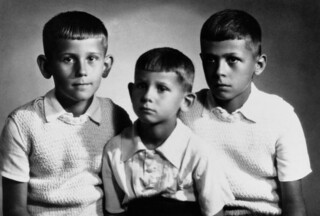‘He left with a pencil in his pocket’
Neda Neynska
The artist Christo, who died on 31 May, was born Hristo Javacheff in Gabrovo 84 years ago. At the age of 21, he escaped from communist Bulgaria to more progressively communist Prague. He never returned, never publicly engaged with Bulgaria in any way, and rarely spoke the language. At the same time, he described himself a foreigner, a political refugee and an immigrant in his adopted homelands. He was stateless for 16 years.
As a student at the National Academy of Arts in Sofia in the 1950s, Christo was confined to the canons of socialist realism and classical studies of form. There wasn’t a way to say or show anything beyond what had to be said and shown. In the summer, art students were sent away to the countryside on ‘beautifying missions’ along the route of the Orient Express, arranging machinery and bales of hay, doing large-scale industrial-themed drawings on the facades of factories, and erecting neat fences, so tourists could look out onto curated scenes of socialist life. This artifice was his first brush with environmental art and Nouveau réalisme.
In an early letter to his older brother, Anani, from Prague, he is apologetic, gentle, angry: ‘I could not bear any more to be crushed and told what art is, when those are lowly lies, absolute nonsense, cynicism. I embrace you warmly. Forgive me, I wish you success and faith in art.’ Christo never stopped dreaming westward and eventually made it, via Vienna, to Paris, where he met his wife and collaborator Jeanne-Claude. Along the way were the common predicaments of many refugees: precariousness, dishwashing, the darkness of a freight wagon, not speaking any language that matters in your new reality.
Language was a disruptive category in Christo’s life. He started speaking late, around the age of six, Anani until then serving as his spokesperson. Then it was Jeanne-Claude’s turn when they moved to New York in 1964. In its obituary, the New York Times called him ‘an eccentric visionary speaking in only semi-comprehensible English’. But even though he learned it at 27, English was the language of his freedom. And New York was ‘the only city in the world where you can speak any broken language and everything is going to be OK’. He felt comfortable, he said, because unlike in Paris, nobody ever made comments if you didn’t speak the language well.
In Bulgaria, Christo was always a divisive figure. Shunned by the regime he escaped, ‘not Bulgarian enough’ for post-Soviet governments, he was widely misunderstood by the public, too. Many people found the scale and ambition of his art unforgivable: there is nothing vernacular or patriotic about it, nothing relatable. Others were offended that he didn’t bring his projects ‘home’.
‘Home’ to Christo meant the loving, worldly, artistic household he grew up in. But it also meant the country where his father, a factory owner and engineer educated in Vienna, was convicted and imprisoned for sabotage, the ‘intentional destruction of Soviet production’, after a drunk worker accidentally burned a hundred thousand metres of fabric by overbleaching it.
A hundred thousand square metres of fabric was used to wrap the Reichstag in 1995. Christo and Jeanne-Claude said at the time that the project was born out of his ‘acute interest’ as a political refugee in the relationship between East and West: ‘Here they meet in the most dramatic way.’ The event received wide press coverage, like all their projects, but was also the subject of a personal documentary about Christo and Anani. Standing beside the wrapped Reichstag, leaning against the remains of the Berlin Wall, Anani, by then a famous actor, is anguished: ‘I never had Hristo’s energy. He left with a pencil in his pocket and made it. I never dared.’
The film also includes plenty of cigarette smoking, moody lighting, and dinner table conversations about life and chance. ‘Hristo, I think there is a deep psychological moment here,’ Jeanne-Claude says at one point. ‘The people who were afraid to say your name during communism, your mind’ – ton esprit – ‘blocked them out. Because usually you remember everything. These things you just don’t want to remember.’ He smiles. There are plans for visiting Bulgaria, Anani offering to pick him up at the airport, incognito, and take him straight to the village where they spent their happiest years as boys. The brothers look at pictures from their childhood together, Christo speaking a little Bulgarian, then switching to French: ‘Je ne me souviens pas.’
It is strange to listen to his delaminated sentences. If I close my eyes and turn the volume down to reduce the words into sounds, the melody of his language – whichever one – is distinctly Bulgarian: the pauses, the flatness where in English or French you would expect a sudden tonal pick-up. He carried with him the blueprint of a ghost language, a sensory memory of a past life. Speaking to a Bulgarian journalist (in English) in 2016, he let slip a few words: lelya Pena (auntie Pena, a village woman who sheltered the family during the war); mama i tati (mum and dad).
